#and solas's name means pride...........
Explore tagged Tumblr posts
Text
bioware uglies can stay in their moral equivocation discourse, i'll be over here with the smarties poring over the tiniest solas-adjacent detail as we dig through themes and foreshadowing lmao
#see also: the theory solas is a spirit of wisdom#and my theory that the mage's harrowing is a repeat of mythal finding him in the fade#since the warden mage origin in dao has them meet with a pride demon#and said pride demon is in disguise and giving the warden hints and help#and the opposite of a spirit of wisdom is a pride demon....#and solas's name means pride...........
9 notes
·
View notes
Text
I think one of the key things to consider when discussing Solas as a character is that his life is heavily... Conceptual?
The Elvhen Empire had a language where meaning was extremely interpretive based on every set conversation. They lived side by side with Spirits and Demons, so they reflected an equally fluid yet painfully rigid world. Solas bears a name that means Pride, with plenty of referenced or hinted at evidence that he was once a Spirit of Wisdom turned from his purpose. Specifically by Mythal, in fact.
But the thing is about this... What if naming him Pride was actually far more complex? Pride in what, exactly? Pride in having a body, pride in knowledge and skill, pride to the point of actionable hubris? Maybe that is part of it.
Yet what is Pride for someone who never was allowed Personal Pride? Or more specifically, embodied pride in service? He HAD been tattooed with vallaslin like the rest of Mythal 's slaves. He had been drawn to form a tangible body to serve her. He must have accomplished so many things for her, in wars, advising, political ploys. Was he named Pride for being so proud to serve the one whom he viewed as "the best" of the Gods?
Ironically, it still suits him even when he decides to reject it. He burns off the vallaslin and slightly scars his face, but isn't he truly proud now? Proud and clean-faced, an individual who serves no one now but himself?
Idk I'm just ruminating on that simple little name of his. It makes him such a conceptual fellow. It leaves me endlessly contemplating the layers.
#solas#dragon age#da:i#rambling#im just thinking about name meanings and the Elvhen language#Pride? pride in what or for whom?#it doesnt always have to be just about spirits#it can also be a taunt or a point of control#nothing is particularly simple with the Evanuris
163 notes
·
View notes
Text
also i don’t think solas will die at the end of veilguard. i think he’ll be fully ready and willing to die in some big fantastical way, but instead he’ll have to humble himself. his sacrifice will be having to lower himself to the same level as the present-day elves he so eagerly wants to separate himself from
#dragon age the veilguard#datv#solas#i mean his name is literally Pride i don’t think he’s going to get the dramatic ending he’s probably hoping on#jayy speaks
25 notes
·
View notes
Text
A Stroke of Jealousy
https://archiveofourown.org/works/58425217
I wanted jealous Solas so I wrote jealous Solas. A little short story from the early days of their romance during the inquisition days.
#dragon age inquisition#solas#solavellan#ao3 writer#ao3#ao3 fanfic#solas x female lavellan#Oressa Lavellan#writing jealousy is actually fun#Jealous Solas is also alot of fun#even more when his name means pride#I love him stupid for Lavellan#hes a dork
21 notes
·
View notes
Text
like there's just something about characters who get their identity STOLEN from them you know? Like specifically losing your sense of identity because people have given you a new name, have twisted who you were supposed to be, it convinced you you were the person they wanted you to be. And when you finally learn the truth the old identity is like a ghost that is haunting you. It's not even a true self anymore because you've grown so much into this new identity that was forced on you -- but it's a ghost of all the what if, of all that could have been if they hadn't pushed you this far to the point you forgot yourself and embraced the harm that they convinced you was good for you.
they killed the old me and faked my new life and now i am staring at my own corpse with no way to return. i am poisoned by what they made me. i'll never be my true self ever again - i was never truly mine to begin with.
who are you if not the shell of who you used to be filled with what they wanted you to become to the point of betraying yourself. a ghost that never even had the time to ever be alive. you'll never be alive again.
the loss of identity and the ghost of who you will never be able to ever be again
#so many of my favs enter this category and it's discussing Mordred that really made it click#bc i don't mean identity crisis in a way that can be solved as easily as just 'oh they lied about who i was but i knew all along'#it's really just 'there is no coming back there is no me anymore'#maybe it also says a lot of unfortunate things about me-#but like. Mordred. Cloud. Allen. I'd argue even Solas to some extend mister 'i had to take this new name as a badge of pride'#oooh fenris and cole also!! DA feeds me so well on this#ichatalks
10 notes
·
View notes
Text
I am the biggest ‘love will save everyone’ proponent out there
But he killed Mythal
The woman he destroyed the world for
He gives you a whole 10 minute monologue about how killing Mythal was The Most Evil Thing Ever
And then he killed her when he decided his goal was important than her life
Mythal
#dragon age#solas#I love solas so much#he is also willing to do horrors to further his ends#he’ll hate himself but he will do it#his name doesn’t mean Pride for no reason#he’ll avoid killing lavellan as long as it takes but if they stand in his way with no meaningful alternative?#yeah he’ll add their name to his long list of dead
34 notes
·
View notes
Text
Some people will look at the most vague fucking thing in the game like a word choice or something that is a little like something in the real world and decide that the intent must've been to make a total 1:1 allegory when in truth it was probably just a random piece of inspiration
I hate to be the 'it's not that deep' person and people can read whatever they want into a piece of media etc but I do also genuinely believe that some things really aren't that deep
#just saw 'solas is the Maker bc his name means light/sun in several real world languages'#it means pride in the in game mythical language and it's referred to multiple times lmao#God damn people do be reaching with some of these theories
1 note
·
View note
Text
My interpretation of all the Solas endings:
I have been wanting to write about this topic for a while, since I’ve seen a lot of criticisms about Solas being out-of-character. IMO all the Solas endings are brilliantly written, and here’s why:
Solas breaks in 3 different ways:
1: Breaks his wisdom (Becomes Pride)
2: Breaks his pride (Becomes Wisdom)
3: Breaks his leash/conviction (Becomes more human)
1: Breaks his wisdom:
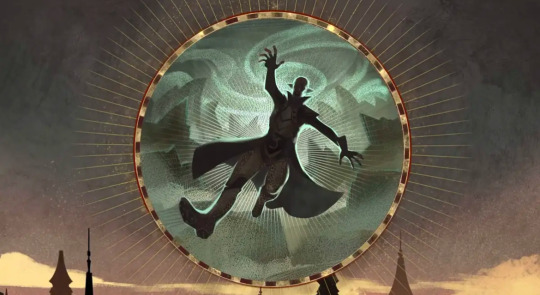
Solas has always walked the line between pride and wisdom: unlike pure spirits, he is able to fluctuate between them - just like Mythal with benevolence and retribution. This makes him more “human” and complex: he even instructs Cole in how being a “demon” and being a “spirit” essentially comes down to a choice we make ourselves.
So Solas is clearly aware of his own failings (just look at his name), but his greatest flaw is not changing in accordance with his own awareness. Due to his wisdom, he knows he is prideful, so he constantly asserts that he is NOT a god: this is as much to make others not worship him as the dread wolf, AND as a mantra to himself to keep him from becoming another Elgar’nan.
However, the limelight is an intoxicating thing, and with him choosing to carry the cross as the dread wolf, he invites that prideful corruption into his heart. It is difficult to truly believe you are not more special than everyone else when everyone else keep telling you how you totally are. As a spirit made man, he is still in danger of becoming what others view him as: he mirrors how you treat him in inquisiton, and he took the name of fen’harel (probably uttered by Elgar’nan) as a badge of pride.
We are told he treats everyone as disposable pawns in order to reach his goals, and we also see the truth of this in his memories. Some people argue that this is out of character for him, since he cares deeply for the elven people and their freedom. I don’t think these things are mutually exclusive: he simply rationalizes everything in order to reach his goal of helping the elves: even if that means sacrificing people
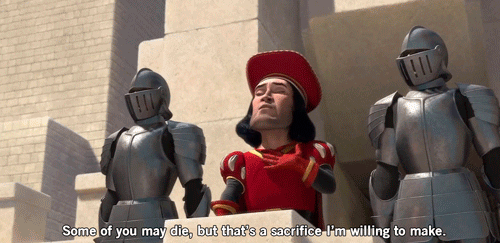
The thing that is so chilling about his character is that he was never meant to lead - he never WANTED to lead either: Mythal was the judge, he her advisor. Without her caring heart to guide his brilliant mind, he becomes callous and makes decisions based only on how best to “win”. This is not to say he does not have a heart, but that he believes he has to set it aside for the greater good: which is exactly where his reasons for leading the rebellion/ tearing down the veil and his methods for doing so contradict each other
He ends up losing sight of his initial reasons because the war makes him so calloused. I believe he shuts down emotionally and can not feel anything but apathy towards everyone when he puts on the mask of the dread wolf - as seen in how he treats the inquisitor vs Rook.
By making so many decisions with such dire consequences and not letting himself feel the weight of that (it would break him) he becomes separated from the “pawns” he uses and stops thinking of them as people. The world becomes a chessboard and a game to him, and that is exactly how a god would think.
That is also the reason he becomes so angry at Rook for saying he views himself as a god: he is so afraid of becoming that conceited, but at this point, the thing keeping him sane and keeping the dam of his pride sealed is the mantra: “I am not a god”. He KNOWS the truth of that mantra, but as this point he doesn’t FEEL it, because he has denied himself to feel anything for anyone in order to be able to get rid of them if logic dictates it.
Through his wisdom he understands why it is detrimental to believe yourself a god, and because of this he is in denial of his own feelings on the matter: he acts like a god, feels like a god, yet knows that he would become what he hates most by acknowledging it - that’s why he uses the mantra: it’s his last effort to stay somewhat grounded.
This brings me to the “I AM A GOD” ending. This is where the dam breaks: he finally allows himself to fully embody his mask; his pride; his demonic side.
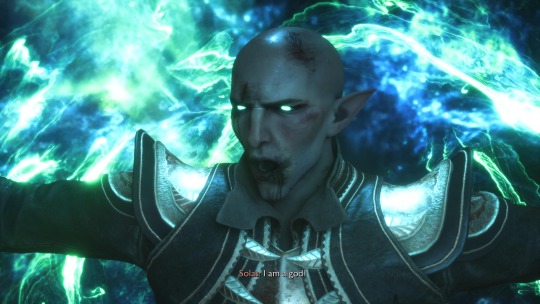
By losing to Rook and co through force he is forced to admit to himself that he sees Rook and the world as inferior - he is the only one who can make it right and they are all children, who do not understand him (they shunned understanding when they used brutish force) because compared to them he is a GOD. He accepts pride and abandons the wisdom of staying grounded with the people - the people abandoned him so he abandons the people. He becomes what he has feared most becoming (it is also interesting that his biggest fear is to be alone - and a god stands alone in their arrogance).
He is truly lost to his demonic aspect in this ending and the dark colours of the ending picture reflect this. It is not difficult to argue this is the most tragic ending.
2: Breaks his pride:
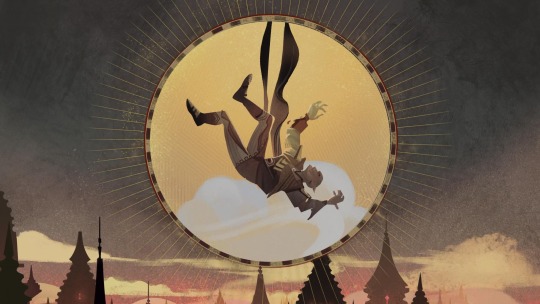
Most schadenfreude ending in terms of outsmarting Fen’harel: proving to the world AND to Solas he is not a god and that he is not immune to be outsmarted by a mortal
It breaks Solas’ ego to be outsmarted, since his cleverness is his pride. It sets him free from his pride as it was the proof he so desperately needed: the people inhabiting this world are capable of being his equal and besting him at his own game. He is not better than them, or better put: his cleverness is not infallible. You could argue that a romanced Lavellan/ friendly inquisitor has already proven to be his equal in terms of wisdom, but then again, he has never truly been their adversary.
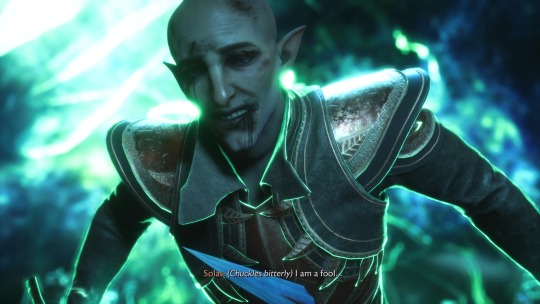
There is a maddening clarity to him when he finally says “and I am a fool”. I find the break of his pride to be heartbreaking: even though we are told it is a demon version of wisdom, we have seen Solas balancing both aspects - and his name also reflects how big a part of him it is. You could argue he becomes less of a person in both the Pride and Wisdom ending, but more demon/spirit. It is a loss of human complexity and he finally returns to the Fade more alike himself before he took on physical form.
Perhaps it can be argued this ending is the best one from Solas’ P.o.V without a romanced Lavellan: after all, she was the only thing that could “steal his attention from the Fade” or in other words: the only reason he would consider willingly taking physical form without being asked to.
3. Breaks his leash:
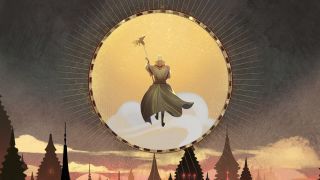
The third one is more complex (so bear with me here), because accepting your mistakes and growing in order to not repeat them requires human complexity. A thing Solas has avoided his entire physical existence. He is stuck in regret, yet would repeat all his mistakes again given the chance.
His avoidance of humanity is best seen in the contradiction of his disregard for lives and his conviction of freedom for the elves. His nature compels him to stand against tyranny and enslavement - to be a champion of freedom of choice and thought. Yet as a leader and a strategist he refuses to acknowledge that people matter in more ways than being pawns. He will grieve them later, yes, but his love for a person will never waver his decision if he deems their sacrifice the best course of action in the war - he will not even ask their consent (as seen with the Disruption spirit in the Fade memories).
He does not acknowledge that people are an intrinsic part of war and their lives matter in that equation. He struggles with his mistakes and the lives lost but he can not stop to think he might be going about it all wrong, because I imagine he fears if he factors in the emotional weight of his choices, it would impede his end goal, or worse: break him into indecision.
The emotional weight of the war and the lives lost, his mistakes and his position as a leader - not an advisor, are so against his spirit nature that he suppresses these issues instead of dealing with them like a person. He becomes prideful because he shuts other options out. His way is the only way.
He sees everything fall apart: everything he does: disaster is sure to follow: The blight, trapping the elven gods, the murder of Mythal (x2) - yet he can not stop. He does not know how. He is desperate for a way out - a way out of regret and feeling the weight of his mistakes - he pushes on because that is his only option lest he truly faces what he has done and the pointlessness of it all. All the lives he has sacrificed need to mean something - that is what he sacrificed them for. How can he face that he killed them and not have an excuse for doing so?
In the last ending he is forced to talk about these things: the Inquisitor tells him he is forgiven if he just stops. Yet this is not enough - he has sacrificed Mythal (and in ways himself) to reach his goal and it can not have been in vain. Here Mythal jumps in and helps him carry the weight of it all by shouldering it beside him. He finally lets himself feel the weight of it all and it breaks his conviction. Mythal releases him from her service: the leash of service to not only Mythal, but to her dreams and visions for the elven people; the very reason he was made manifest in the physical world, and so their very long and increasingly painful relationship comes to an end. He gets closure. He allows himself to grow and so he sets out to undo his mistakes: to sit with them (the blight) and truly do the best he can to heal what can be healed. It is the most difficult ending - a true apology: he has to pull a Bharv.
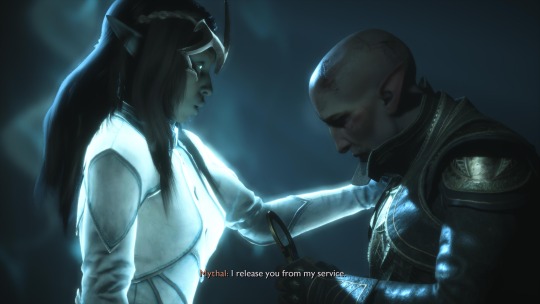
It is also the ending which was foreshadowed if you chose to let Varric help Cole in inquisition. I might get into this more in another post, but essentially he becomes more human by dealing with his shit and growing. It is a warm thought that the best ending is the ending Varric helped make way for.
It wraps up the story nicely as well: he enters the Fade a human, just like he entered the physical world a spirit, underlining the complexity of his character arc.
This is also the only ending in which he can end up with Lavellan: I think it is poetic that she can only join him if he becomes more human, less spirit; a mix of both Wisdom and Pride. He has to accept his humanity and the weight of a human heart - metaphorically, he has to make the choice to finally enter the physical world and all of its complexities of his own volition: and there he finds her waiting.
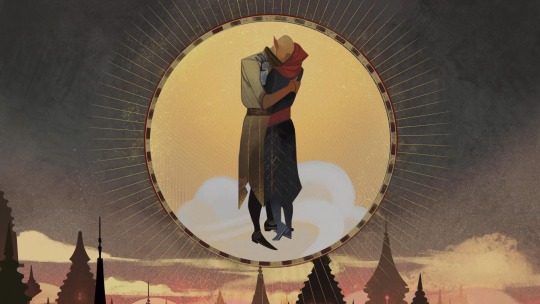
#dragon age veilguard#da: the veilguard#veilguard spoilers#dragon age the veilguard#Veilguard#dragon age#solas#Lavellan#solavellan#Mythal#fen’harel#dread wolf#dragon age theory#dragon age ending#dragon age analysis#elgar’nan#wisdom#pride
553 notes
·
View notes
Text
Times other people discussed Solavellan + Times Solas and Lavellan talked about each other (dav)
"I've seen how you look at him. You're in it" - Sera
"Is it my imagination, dear, or have certain... lingering looks passed between you and our Solas?" - Vivienne
"You're real, and it means everyone could be real. It changes everything, but it can't" - Cole
"The two of you were close. Perhaps he had no choice? He might return at any moment" - Leliana
"How have you been? It seems ages since we've spoken. I know you were cruely disappointed when Solas left" - Vivienne
"Are you hoping for word on Solas? I'm sorry, Inquisitor. I'm afraid I have nothing" - Leliana
"I've been meaning to ask... Solas hasn't come back? Sent word? Anything?" - Thom
"Oh, and Inquisitor? Feels weird, but I'm sorry Solas never came back. Well, no, I'm not, but... I'm sorry he left you." - Sera
"I am not a god, Charter. I am prideful, hotheaded, and foolish, and I am doing what I must. When you report back to the Inquisitor…. Say that I am sorry.” - Solas
"Maybe it's gullible of me, but I know the Inquisitor feels the same: Solas isn't too far gone to bring back" - Varric
"Solas was... important to me. If this statuette helps you understand him, if it uncovers something that... Honestly, I don't know. I wish I did. But this feels like a part of him, and whatever he and I once were... I think... I-I hope... it might help you" - Lavellan
"And when I served the Inquisition, I tried to avoid entanglements" - Solas
"Except for Inquisitor Lavellan" - Rook
"I said that I resolved to do so, not that I succeeded. She's a good woman. Growing close to her was... selfish of me" - Solas
"Do you regret it?" - Rook
"I live with countless regrets. Some of them I have grown to cherish more than my victories" - Solas
"Solas took this path because he thinks he has no choice. But the Inquisitor believes there is another way for him. For them. She could save him, if he would just let her" - Harding
"God of Lies, Dread Wolf, Fen'Harel. They're titles he earned from enemies, followers and fractured history. He and I shared another name: Vhenan" - Lavellan
"You've spoken to him in your dreams. You've felt the power of that mind. His love could burn against me like a bonfire. He seemed so kind, and wise, and sad, and looked at me as if I somehow mattered more than anything around us. For a time... I thought I would have followed anywhere he asked me to" - Lavellan
"Or maybe I'm the prideful one, imagining his broken heart so that I never have to face my folly. That I loved someone who made such grave mistakes. That I might love him still" - Lavellan
"He really made you happy?" - Rook
"Yes, he really did" - Lavellan
"Harding... I am sorry" - Solas
"For what, Solas? Betraying the Inquisitor and breaking her heart?" - Harding
"Is there any chance - any chance at all - that he would listen to reason?" - Lavellan
"Speaking from the heart, Inquisitor?" - Morrigan
"With Elgar'nan and and Ghilan'nain dead, and the Inquisitor finally reunited with her true love... it looked like one of the biggest stories this world had ever seen was finally drawing to a close" - Varric
#dragon age#dragon age veilguard#dav#solavellan#solas#dai#veilguard spoilers#dav spoilers#dragon age spoilers#datv spoilers#da4 spoilers#started this a while back#this is all basically outsider's pov on Solavellan#since when they talk about each other in DAV it's to Rook#debated adding Solas' letter to Lavellan but since it was addressed directly to her (and she found it) it'd no longer be outsider's pov#dragon age trespasser
319 notes
·
View notes
Text
Walking the Din'anshiral: Inquisitor Lavellan
Days ago, I wrote about Solas invoking the din'anshiral in Trespasser. But Solas is not the only one who walks it. Inquisitor Lavellan, left in the aftermath of Trespasser, begins her own long journey on it. However, unlike Solas, the path doesn't destroy her - it reveals instead her resilience and inner strength and that she's redefined the meaning of the path itself.
To understand her arc, we return to the moment Solas first names the din’anshiral:
Lavellan: Let me help you, Solas. Solas: I cannot do that to you, vhenan. Lavellan: But you would do it to yourself? I cannot bear to think of you alone. Solas: I walk the din’anshiral. There is only death on this journey. I would not have you see what I become.
Many have interpreted Lavellan’s ‘let me help you” as a willingness to join Solas’s cause, but I see a different interpretation. This dialogue sets a foundation for the Lavellan we meet in Veilguard - the one who has not ended the relationship and who ‘vows to save Solas from himself’. Let’s call this Lavellan Atonement Lavellan. This specific dialogue reflects a lot about this character’s written core – how she sees Solas and instinctively refuses to abandon someone to suffering.
If you are playing Atonement Lavellan - or choose to have any high approval Inquisitor in the atonement ending - I believe you are playing a character oriented toward connection.
Atonement Lavellan instinctively understands that Solas’s weakness isn’t his pride or arrogance - it’s his isolation. Her offer to walk beside him is a quiet act of resistance against the ideological death march he's committed himself to. She isn’t offering agreement with his plans - she’s offering her presence. I'm not certain at this point Lavellan has a plan, she's winging it (she's just found out he's the Dread Wolf after all), but all she knows is that she can't bear to think of him alone, meaning she intuitively knows that him cutting himself off from connection is not good.
Replaying Veilguard and returning to this moment in Trespasser, I saw this Lavellan symbolizing connection as a response to suffering. This is consistent with the kind of Inquisitor who helps Cole find his way, who hugs Varric after losing Hawke, who checks in on Cullen during his withdrawals and who offers Blackwall another chance. This is an Inquisitor who meets pain with presence and that doesn’t believe pain should be carried alone.
This dialogue choice also reveals something about Atonement Lavellan’s character framework in this narrative. She's not operating from wounded pride, nor seeking affirmation of his love as a salve for her own pain. Her instinct tells her this isn’t about her - it’s about the internal war Solas is fighting against himself. She swallows her own pride and heartbreak (heartbreak that would have been justified) to reach for something higher – something Solas is unable to do. Her true opponent in that moment isn’t actually Solas. It’s the din’anshiral itself.
What I love about Atonement Lavellan is how she balances two seemingly irreconcilable truths: she is the Inquisitor, a symbol of political leadership and martial consequence - and she is also someone who loves a man now prepared to destroy the world. Her narrative doesn’t resolve that tension – it lives in it. It is her din'anshiral.
Lavellan’s Own Din’anshiral
"I am here, walking the din'anshiral with you."
A quiet evolution takes place for Atonement Lavellan between Trespasser and Veilguard - one we don’t witness directly in the game, but which becomes clear in these words to Solas. In the years since Trespasser, she has walked her own road of sorrow and loss. All Inquisitors bear the heavy responsibilities of consequence, but for this elven Inquisitor, the din’anshiral resonates on an ancestral level. It connects her to the ancient Elvhen world, becoming a journey she walks to understand Solas more deeply, to understand that world. Somewhere in those intervening years, I believe Atonement Lavellan made a conscious choice to walk the path. But where Solas walks the din’anshiral in service of destruction, Inquisitor Lavellan walks in resistance to it.
By Veilguard, we see a romanced Atonement Lavellan who has paid a steep personal price for her choices. Her clan has been harmed or killed due to war table decisions. Learned revelations that have shaken her understanding of her gods and culture. She's a Dalish elf forced into the role of a religious symbol in a Chantry-dominated South and has either disbanded the Inquisition or surrendered it to the very systems that once oppressed her people. The Venatori still hunt her. The Grey Wardens don’t trust her. Varric is dead - killed by Solas. The title of Inquisitor, regardless of their background, is marked by compromise, impossible choices, and death.
Despite the collapse of the Inquisition and years of political fallout, it is still the Inquisitor the people look to when the South begins to weaken under the failed ritual's chaos. That tells us something fundamental about who the character of Atonement Lavellan has become through the din'anshiral lens. The path includes defending a world that both mistrusts and depends on her. And in this new war, she may well die before ever facing Solas again. No promise of reward, no expectation of reunion. Even stripped of title and institution, she stands at the center of the fight, holding the truth that she leads Southern Thedas’s survival because of him.
And this is the contrast to her walking the path as opposed to Solas. She's reclaiming the din’anshiral, transforming it from a path of death into a journey of survival. She doesn't give in to despair, though it might have tried to claim her many times.
So when Lavellan stands before Solas at the end of Veilguard, her words carry all of that. "I am here, walking the din'anshiral with you" - is a declaration forged through lived experience. She’s a woman who has known her own darkness and has chosen, again and again, not to let it define her. In my eyes, she is a hero of Thedas, standing beside a broken god, offering not salvation, but presence. Oh, what the history books will say of her 100 years from now!
Whether the din’anshiral began as a vow of exile among the ancient elvhen or is simply a metaphor of ruin, there’s a quiet symmetry in Lavellan telling Solas that she, too, has walked it - not in opposition, but in parallel - their two paths finally merging.
Is the din’anshiral over for them? Not yet. Lavellan’s words in the present tense make that clear. For the Atonement Lavellan who leaves with Solas, it's the continuation of that path - perhaps shadowed and uncertain at first - but no longer walked alone.
#oh inquisitor lavellan#no one can ever make me hate you#and it's quite poetic that this character is such a controversial one#that even in the real world of player perception she walks the din'anshiral#so mocked and criticized#the din'anshiral#solas x lavellan#romanced lavellan#dragon age veilguard#dragon age trespasser#tried to keep balance between general Inquisitor and Lavellan Inquisitor#but the din'anshiral is romance lavellan specific#hence this post being focused in that state#how many times can I write din'anshiral?#dai#datv#f!lavellan#Inquisitor Lavellan#solavellan#vhen'harel#Dreadquisitor#fen'herald
123 notes
·
View notes
Text
solas telling emmrich he is a manifested spirit of "wisdom" instead of "pride" has me in an absolute fucking chokehold. what do you mean you want your old name back despite not being a spirit anymore? what do you mean the name you took, 'solas' (pride), doesn't apply any longer? what do you mean you still think you are Wisdom™️ The Thing when you walked away from the finest, most understanding woman in the entire world? what do you MEAN you're REBRANDING after causing the first apocalypse and trying your damndest to start another? what!! do!! you!! mean!!!!!!!!!!
#solas#veilguard#datv#emmrich volkarin#this is NOT how rebranding works u absolute moron omg#he is so fascinating i just#jeeeeeesus#veilguard spoilers#datv spoilers#mine
184 notes
·
View notes
Text
On a more serious note regarding the "Solas is like the devil on your shoulder constantly trying to make you make bad decisions".. I think @corseque made a good point, in that Fen'Harel in Dalish legends is known for giving cunning advice that, in true trickster fashion, may lead to a helpful outcome, but always at a cost or in a twisted way. We talked about how Solas might try to prevent Rook from trusting their companions because of his own issues/experiences with betrayal or that he might try to use Rook as a piece on his own "chess board".
But I think this also goes back to the mage origin in DAO and you being tested by Mouse, a pride demon, and how the greatest danger of the Fade is, after all, careless trust. I'm also thinking back to this banter between Solas and Vivienne, in which she literally said that he "sounds like a pride demon" trying to tempt you to "leave the path". Or Cullen saying that no demon will ever possess him because he is "too much like they are". Given that Solas literally translates to Pride and the Dread Wolf itself being described as a pride demon, this "devil on our shoulder" might end up being like one big test for us to pass throughout the story, much like the Harrowing in Origins. And building on that, there's also still this crucial piece of dialogue from Solas himself, talking about the perception of spirits and demons:
"The Fade reflects the minds of the living. If you expect a spirit of wisdom to be a pride demon, it will adapt. And if your mind is free of corrupting influences, if you understand the nature of the spirit, they can be fast friends."
In DAI, Solas was already a reflection of how you treat him. If it's true that, what the devs seem to be hinting at, we actually get to learn and see what happened in the ancient past and who Solas was before he "called himself Pride" (keeping in mind that Rook doesn't know anything about Solas as a person at the start of DA4), and we come to "understand his true nature"/original purpose/true name, then the above quote might be an analogy for how the relationship between Rook and Solas can develop and how we can influence Solas' character arc (on top of the relationship between him and the Inquisitor already having a huge impact on him?).
And if you think about it, it's so brilliant how they seem to put a spin on the whole thing now, by having the "pride demon" be the one who needs to trust the one who dreams. Or rather, expecting the pride demon to be a spirit of wisdom, and not the other way around.
The idea that Rook challenging/rivaling Solas by going against his "devil on our shoulder" advice/proving him wrong/"pass the test" and not expecting him to be that pride demon after Rook comes to understand his true nature/original purpose, could lead to him being more likely to "adapt", open up and learn how to trust again is so beautiful to me, but that could also mean a challenge for us Solas fans if we have to (at least in the beginning) bump heads with him in order to see that development. 🥲😂 Either way, Solas is truly in for the most intense kind of therapy session.
#today on another episode of ''me reading way too much into one off hand comment by the devs'' lol#solas#da4#datv#datv spoilers#speculation time
287 notes
·
View notes
Text
Different personalities of Solas in different endings
To get rid of my intrusive thoughts about Solas' lore in Dragon age, I've decided to rant once again. This time it it about the different endings in Veilguard that we can witness and how Solas describes himself in them. Canonically there are 3 endings:
Solas is tricked by a fake dagger
We defeat Solas in open fight
Solas is redeemed and wil sends himself to the Fade prison
After watching all of them (and experiencing the third one in my own playthrough) i realized how different he describes himself in each ending and what does it mean. So lets begin the rant!
Solas is tricked by a fake dagger
In the final conversation with Rook, he admits that they are as tricky as him, the God of trickery. And at the end he descirbes himself as a fool. He finally humbles himself admitting to the defeat and even tho he tries to argue earlier ( by saying what he survived etc.) but at the end, Solas finally admits, that he lost and that he lost fairly, by the rightful person
2. We defeat Solas in open fight
This is the ending i find the most interesting. The fight is not the interesting factor but what he say at the end. "I am a god!" he scream when hes pulled to the fade prison. Funny isn't it? The man that tried to tear Evanuris down from their godly status saying, they were only wizards, spirits, that because of the flow of the time, were named gods at the end of Arlathan. But now? When he lost in an open fight? I like to think that he lived up to his name and he became the most prideful Evanuris, killing his spirit of Wisdom that he once was.
3. Solas is redeemed
He doesn't say anything here about himself, just that he will see atonement. Wich a) the fact he doesn't name himself "fool" or "a god" like before proves he is already humbled and doesn't think about himself, just how to fix things b) he ADMITS TO THE MISTAKES LADIES AND GENTLEMEN!!!. He knows he fucked up, and he will do everything what he can to fix it. The fact he openly says we are right and he is wrong also proves he is no longer 'Pride'. He sees wisdom in what we wanted to tell him and he agrees. Which also i think only shows he left his corrupted spirit that was 'Pride' and goes back to be 'Wisdom'
(PS: sorry for mistakes its 1 am for me TT)
#solas#dragon age#dragon age the veilguard#solas dragon age#solavellan#solas x female lavellan#datv#dragon age inquisition#datv spoilers#dragon age veilguard#veilguard#rook#DAV#datv rook#da4
64 notes
·
View notes
Text
Regarding Their Deepest Fears
I heard/researched all of Nightmare's taunts and learned one thing... that the grand fear demon is one sassy bitch.
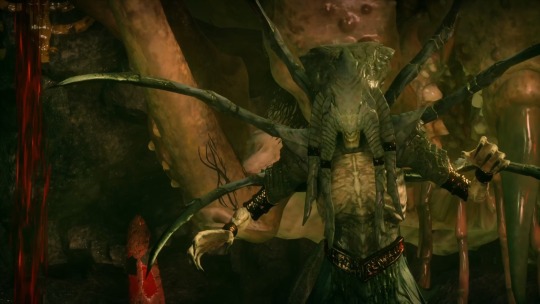
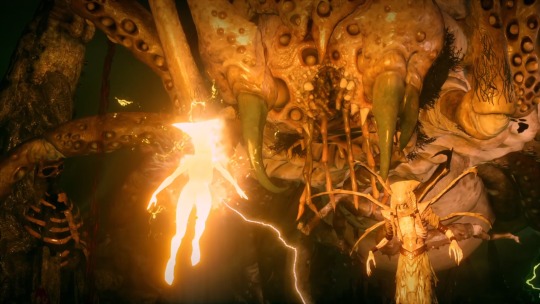
Nightmare to the Inquisitor
Nightmare: Ah, we have a visitor. Some foolish little boy/little girl comes to steal the fear I kindly lifted from his/her shoulders. You should have thanked me and left your fear where it lay, forgotten. You think that pain will make you stronger? What fool filled your mind with such drivel? The only one who grows stronger from your fears is me. But you are a guest here in my home, so by all means, let me return what you have forgotten.
Nightmare to Hawke
Nightmare: Did you think you mattered, Hawke? Did you think anything you ever did mattered? You couldn't even save your city. How could you expect to strike down a god? (Romanced) (Name of love interest) is going to die, just like your family, and everyone you ever cared about. (Romanced Sebastian/No Romance) You're a failure, and your family died knowing it. Diplomatic Hawke: Of course, a fear demon would know where to hurt us most. We must ignore it. Humorous Hawke: Well, that’s going to grow tiresome quickly. Aggressive Hawke: I’m going to enjoy killing this thing.
Alistar (Theirin)
Nightmare: Did the king's bastard think he could prove himself? It's far too late for that. Your whole life you've left everything to more capable hands. The Archdemon, the throne of Ferelden… Who will you hide behind now? Alistar: Is that all it's got? I've heard worse than that from Morrigan.
Loghain Mac Tir
Nightmare: Teyrn Loghain Mac Tir, the brilliant commander. Pity the one time you tried to rule, you failed so miserably. You had to be beaten, humiliated, lest you destroy your own country. You even doomed the Wardens by bringing the Inquisitor down on them. You destroy everything you touch. Loghain: (Grunts.) Is that all you've got? It's nothing I've not said to myself.
Jean-Marc Stroud
Nightmare: Warden Stroud. How must it feel to devote your whole life to the Wardens, only to watch them fail? Or worse, to know that you were responsible for their destruction? When the next Blight comes, will they curse your name? Stroud: With the Maker's blessing, we will end this wretched beast.
Blackwall (Thom Rainier)
Nightmare: Ah, there’s nothing like a Grey Warden. And you are nothing like a Grey Warden. Blackwall: I’ll show you a Warden’s strength, beast.
Cassandra Allegra Portia Calogera Filomena Pentaghast
Nightmare: Your Inquisitor is a fraud, Cassandra. Yet more evidence there is no Maker, that all your “faith” has been for naught. Cassandra: Die in the Void, demon.
Cole
Nightmare: Are you afraid, Cole? I can help you forget. Just like you help other people. We’re so very much alike, you and I. Cole: No.
Dorian Pavus
Nightmare: Greetings, Dorian… It is Dorian, isn’t it? For a moment, I mistook you for your father. Dorian: Rather uncalled for.
Iron Bull
Nightmare: The Qunari will make a lovely host for one of my minions. Or maybe I will ride his body myself. Iron Bull: I’d like to see you try.
Sera
Nightmare: Sera, Sera, Sera… If you shoot an arrow at me, I’ll know where you are. Sera: Out of my head, bitch-balls!
Solas (Fen'Harel)
Nightmare: Dirth ma, harellan. Ma banal enasalin. Mar solas ena mar din. Solas: Banal nadas.
Nightmare Translation: Dirth ma, harellan. (I know you, trickster.) Ma banal enasalin. (Your victory was no triumph.) Mar solas ena mar din. (Your pride/triumph will be your end.) Solas Translation: Banal nadas. (Nothing is inevitable.)
Varric Tethras
Nightmare: Once again, Hawke is in danger because of you, Varric. You found the red lyrium. You brought Hawke here… Varric: Just keep talking, Smiley.
Vivienne de Fer, First Enchanter of Montsimmard
Nightmare: What’s it like living as an apostate, Vivienne? Do you really think you’ll reclaim your power in the Circle… at your age? Vivienne: Not one word.
#dragon age#dragon age inquisition#here lies the abyss#dragon age companions#da:i companion fears#blackwall#cassandra#cole#dorian#iron bull#sera#solas#varric#vivienne#inquisitor#hawke#dragon age alistair#dragon age stroud#loghain mac tir#dragon age nightmare#fear demon#nightmare is a sassy bitch#gotta love the fade
55 notes
·
View notes
Text
Saw someone on Reddit say Solas doesn’t truly love Lavellan cuz he didn’t stop for her and her alone and I’m just…
Did you really want a “Power of True Love” ending?
That would’ve been dumb as fuck.
Some people really do just think in black and white, don’t they?
Also, how can you see this and tell me that this man does not love her????
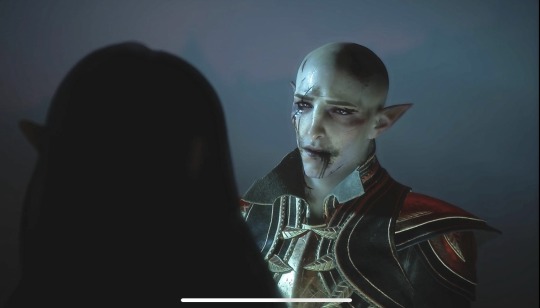
If anything, his problem is that he thinks he doesn’t deserve her.
The man whose name literally means “Pride”, and for all his bravado, still believes he’s not good enough.
He’s not, but bitch don’t tell me what to do. Marry me, egghead.
116 notes
·
View notes
Text
Who thought it was ok to give solas such plush perfect lips? Was that his idea? Damn no wonder his name means pride I mean have you seen what he came up with???? He be poppin out of the evanuris character creator with those kissable lips like ‘yeah I am that bitch’
#da shitposting#I jus saw him and was overtaken#those lips were made to be kissed by his vhenan!!!#solavellan#solas dragon age#da solas#solas#evanuris
64 notes
·
View notes